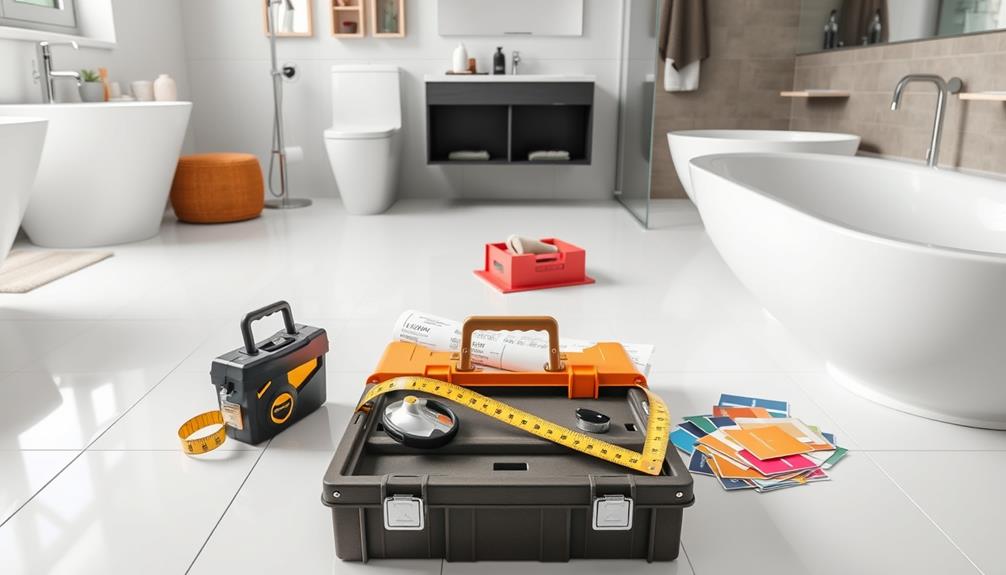To start a bathroom remodeling business, you must first conduct thorough market research to grasp the demand and analyze your competitors. Develop a comprehensive business plan that identifies your target customers and includes financial projections. Choose a legal structure, such as an LLC, and secure the necessary licenses and insurance for protection. Cultivate relationships with suppliers to ensure access to quality materials at favorable rates. Devise a marketing strategy that leverages social media and referrals to attract clients. Establish competitive pricing based on your costs. Are you ready to transform your vision into reality? There’s a vast realm to explore as you embark on this thrilling journey! Before launching your bathroom remodeling business, consider offering free workshops or webinars to position yourself as an industry expert and build trust with potential clients. Providing valuable bathroom renovation tips can further establish your credibility and draw in clients. Additionally, network with professionals in the construction and interior design sectors to garner referrals and expand your customer base. With meticulous planning and execution, your bathroom remodeling business can flourish and become a top choice for homeowners seeking to enhance their bathrooms.
Key Takeaways
- Conduct thorough market research to identify competitors, customer demographics, and trends in bathroom remodeling to guide business strategies.
- Develop a comprehensive business plan outlining target markets, services offered, financial projections, and marketing strategies.
- Choose an appropriate legal structure, obtain necessary licenses, and ensure compliance with local regulations and building codes.
- Secure essential insurance coverage, including general liability and workers' compensation, to protect against potential claims and liabilities.
- Establish strong supplier relationships to ensure access to quality materials and competitive pricing for remodeling projects.
Conduct Market Research
When starting a bathroom remodeling business, it's essential to conduct thorough market research. This step allows you to identify local competitors and analyze their pricing structures, service offerings, and customer reviews. By understanding what others are doing, you can effectively differentiate your business in a robust market valued at approximately $350 billion.
Additionally, having a solid understanding of common financial terms will help you navigate the financial aspects of your business more effectively.
Understanding customer demographics is another important aspect. For instance, older homeowners often have equity in their homes and represent a significant segment for bathroom remodeling projects, especially those aimed at aging in place. Engaging directly with potential customers through surveys or local community events can provide valuable insights into their specific needs and desires for renovations.
Utilizing tools like bathroom visualizers during your market research can also be beneficial. These tools help reveal customer preferences and trends, allowing you to tailor your offerings to meet the demand for modern, stylish, and functional designs.
Ultimately, your market research will guide your service offerings and marketing strategies, ensuring you're well-equipped to attract and retain clients in this competitive industry.
Develop a Business Plan
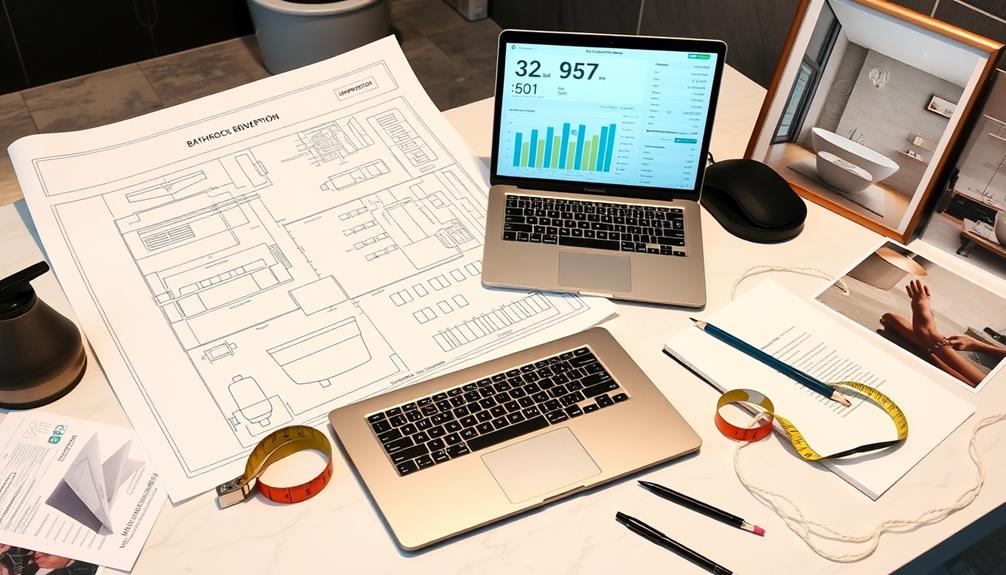
A well-crafted business plan serves as the roadmap for your bathroom remodeling venture, guiding you through the complexities of starting and operating your business. In the competitive remodeling industry, it's essential to outline your target market—focus on demographics like older homeowners and those looking to age in place. This helps shape your marketing strategies and service offerings.
Here's a snapshot of what to include in your business plan:
| Key Component | Description | Importance |
|---|---|---|
| Target Market | Older homeowners, aging-in-place clients | Tailors services and marketing |
| Financial Projections | Startup costs: $50,000 to $500,000; 15% gross profit goal | Guides budget and funding |
| Services Offered | Kitchen and bathroom remodeling; subcontracting specialized tasks | Guarantees quality and efficiency |
Define your services clearly, incorporate marketing strategies across traditional and digital platforms, and set specific operational goals, like completing 40 bathroom projects monthly for a $10 million revenue target. This structured approach will keep you on track and adaptable as your business grows.
Legal Structure and Registration

When starting your bathroom remodeling business, you need to choose the right legal structure, like an LLC, to protect yourself from personal liability.
This decision is vital as it can also impact your tax obligations and management structure.
Additionally, researching local licensing and permit requirements is important to guarantee you're compliant with regulations and avoid any penalties related to your operations.
For further insights on legal considerations for investments, don't forget to register your business name to avoid any legal complications down the road.
Business Entity Types
Choosing the right business entity type is important for starting your bathroom remodeling business, as it impacts your liability protection and tax obligations. The four primary business entity types you should consider are Sole Proprietorship, LLC (Limited Liability Company), C Corporation, and General Partnership. Each offers different levels of liability protection and tax implications.
Conducting thorough background checks on potential employees can help guarantee workplace safety and compliance, which is particularly important in the remodeling industry where customer trust is essential employers conduct background checks.
An LLC is often recommended for solo entrepreneurs in the remodeling industry. It provides personal asset protection from lawsuits and debts while allowing operational flexibility. On the other hand, a Sole Proprietorship is the simplest structure, but it exposes you to personal liability, which can be risky.
When registering as a business entity, you'll need to file with your state and may need specific licenses based on your location and services offered. Conducting thorough research on state business records, social media, and trademarks is important to guarantee your chosen business name is unique and not already in use.
Understanding the advantages and disadvantages of each business structure—like tax treatment and liability exposure—will help you make informed decisions that align with your business goals.
Licensing and Permits
What licenses and permits do you need to start your bathroom remodeling business? First, you'll likely need a contractor's license, which varies by state. This could involve passing an exam and proving your experience and insurance. Many states also require general liability insurance, typically starting at $1 million, to shield you from potential claims.
Additionally, it's prudent to reflect on how your business can benefit from diversification of retirement portfolio strategies that involve precious metals, as this could provide financial stability in the long run.
Next, it's important to research local zoning laws and building codes. You may need specific permits for plumbing, electrical work, and any structural changes you plan to make. If you're taking on specialized work, such as plumbing or electrical installations, additional certifications or licenses may be required, as these often have their own regulatory requirements.
Lastly, contemplate registering your business as a legal entity like an LLC or corporation. This step not only provides personal liability protection but also helps you establish credibility.
Make sure to file the necessary paperwork with your state to get started. By taking these steps, you'll set a solid legal foundation for your bathroom remodeling business, ensuring you're compliant and ready to tackle your projects confidently.
Obtain Necessary Licenses
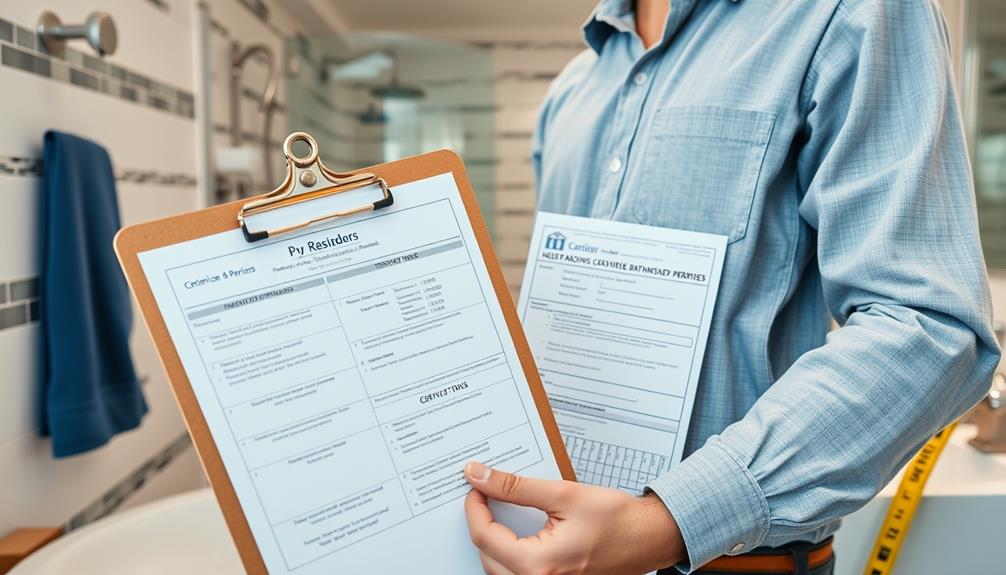
Maneuvering the maze of licensing requirements is crucial for launching your bathroom remodeling business. Start by researching your state and local regulations to determine the specific licensing requirements for remodeling contractors. Generally, you'll need to obtain a general contractor's license, which may involve passing an exam and demonstrating your experience and financial stability.
Here's a quick overview of key requirements:
| Requirement | Notes |
|---|---|
| General Contractor's License | May require an exam and proof of experience |
| Specialty Licenses | Needed for plumbing, electrical, or HVAC work |
| Insurance | General liability and workers' compensation required |
In addition to your general contractor's license, consider acquiring additional specialty licenses if your services extend beyond general remodeling. Don't forget to verify you have general liability insurance and, if you hire employees, workers' compensation insurance. These are typically mandatory for maintaining your contractor's license. Finally, keep your licenses and insurance up to date by renewing them as required to stay compliant and avoid any legal issues.
Secure Insurance Coverage
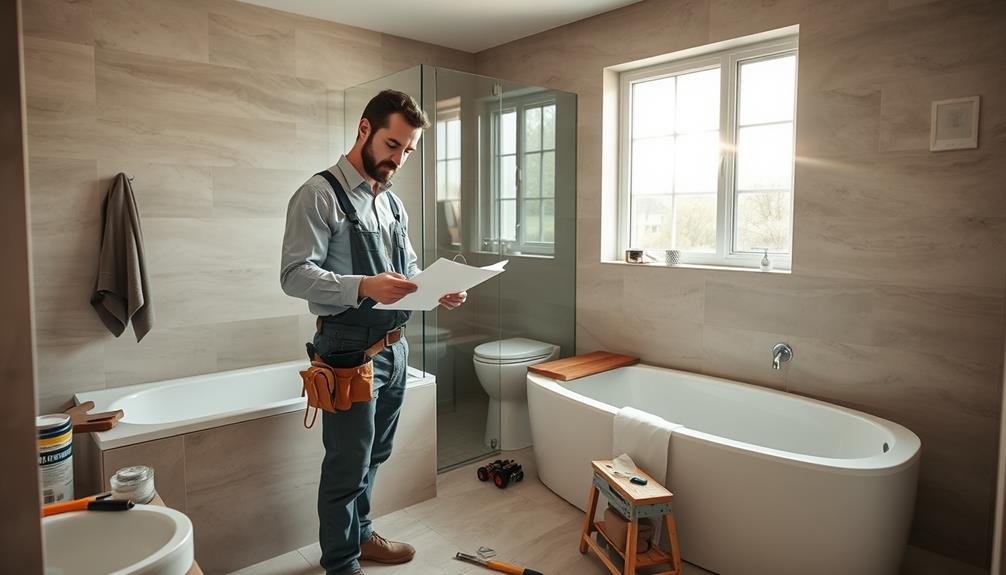
Securing the right insurance coverage is essential to protect your bathroom remodeling business from potential risks.
Home security systems can also play a significant role in safeguarding your work sites and tools, as studies show that homes without security systems are 300% more likely to be burglarized increased safety and peace of mind.
You'll need to evaluate various types of insurance, including general liability and workers' compensation, to safeguard both your clients and employees.
Don't forget to factor in the costs of these policies as you plan your budget.
Types of Insurance Needed
When starting a bathroom remodeling business, having the right types of insurance is vital for protecting your investment and guaranteeing smooth operations.
You'll want to take into account several key policies to safeguard against potential risks, especially since unexpected events can arise, much like the volatility seen in investment markets such as Bitcoin risk management strategies.
- General Liability Insurance: This is important for protecting your business from claims related to property damage or bodily injury during projects. It acts as a safety net, covering legal fees and settlements.
- Professional Liability Insurance: This type of insurance protects you against claims of negligence or inadequate work. If a client feels the remodeling didn't meet their expectations, this coverage guarantees you're financially protected.
- Workers' Compensation Insurance: If you have employees, this insurance is typically legally required. It covers medical expenses and lost wages for workers injured on the job, keeping your workforce secure.
Additionally, don't overlook commercial vehicle insurance for any business-related transportation and tools and equipment insurance to cover repairs or replacements for essential tools.
Cost Considerations for Coverage
Understanding the costs associated with insurance coverage is key for your bathroom remodeling business. Securing general liability insurance is vital, as it protects you against claims related to property damage or bodily injury. The average annual cost for this coverage ranges from $400 to $1,500, depending on your business size, location, and coverage limits.
Additionally, having a strong understanding of best practices in software quality assurance can help streamline your business processes, guaranteeing high-quality service delivery.
Additionally, don't overlook workers' compensation insurance, which covers medical expenses and lost wages for employees injured on the job. This insurance typically costs between $0.75 and $2.00 per $100 of payroll, so it's important to factor this into your budget.
You should also consider the specific risks associated with bathroom remodeling, such as water damage or mold, and discuss these with your insurance provider to make certain you have appropriate coverage.
Many remodeling businesses opt for a business owner's policy (BOP), which combines general liability and property insurance. This option can save you money, with premiums averaging 10-20% lower than purchasing each policy separately.
Importance of Liability Protection
Protecting your bathroom remodeling business with liability insurance is essential for safeguarding both your finances and reputation. As a contractor, you face various risks during projects, including the potential for accidents that could lead to significant financial repercussions. Having the right coverage can prevent significant financial losses.
Additionally, understanding the importance of mammography guidelines can help contractors manage their health risks while working in the field.
Here are three key reasons why you should secure liability protection:
- Legal Coverage: Liability insurance covers legal fees associated with claims for property damage or bodily injury, ensuring you won't bear these costs alone.
- Licensing Requirement: Many states require contractors to have liability insurance to obtain necessary licenses, making it a critical step in establishing your remodeling business legally.
- Boosts Customer Trust: Clients prefer working with insured contractors, as it reflects professionalism and commitment to quality work, enhancing customer trust and satisfaction.
Failing to secure appropriate insurance can put both your personal and business finances at risk. A single claim could jeopardize everything you've worked for, so investing in liability insurance is a smart move.
Establish Supplier Relationships

Establishing strong relationships with suppliers is vital for your bathroom remodeling business, as it can lead to better pricing and timely deliveries. Building these supplier relationships helps you access quality materials necessary for successful bathroom remodeling projects.
A holistic approach to supplier management can enhance your overall business strategy and improve project outcomes, as it emphasizes not just price, but also quality and service. Start by attending industry trade shows and networking events, which provide excellent opportunities to connect with potential suppliers and stay updated on the latest products and trends content relevance and authority.
Consider forming partnerships with local suppliers to foster trust and guarantee personalized service. Local suppliers often understand the specific needs of your community and can offer tailored support.
Leverage online platforms to compare offerings and negotiate favorable terms that enhance your project's profitability.
It's also important to regularly review and assess supplier performance. Confirm they consistently meet your quality standards and delivery timelines, as this directly impacts customer satisfaction.
By maintaining strong supplier relationships, you not only secure the best materials but also create a reliable network that can support your business's growth.
Create a Marketing Strategy
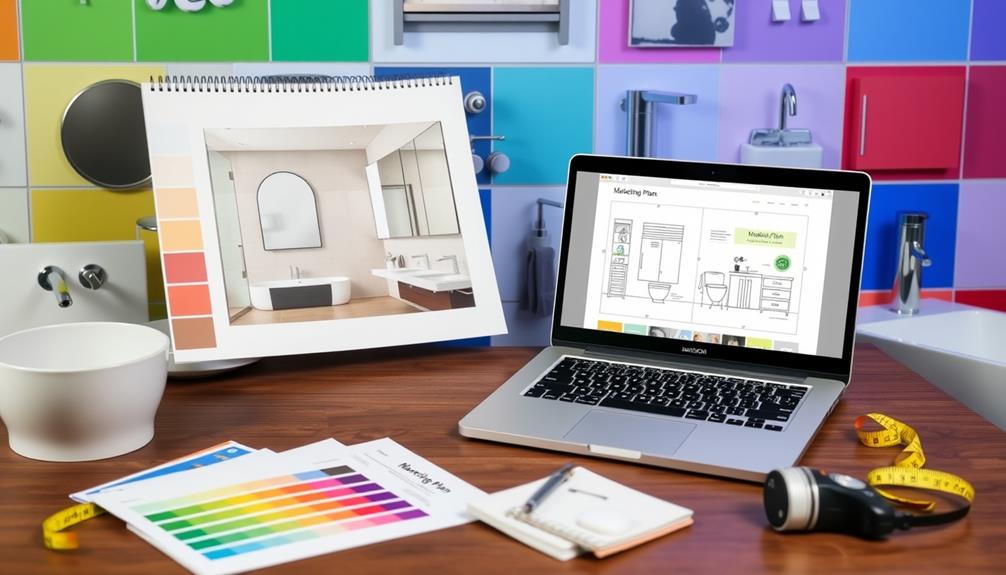
Creating a marketing strategy for your bathroom remodeling business is essential to stand out in a competitive market. A focused marketing plan should showcase your specialization, as clients prefer contractors with expertise.
To further enhance your credibility, think about highlighting your commitment to customer service, similar to how Noble Gold Review: Precious Metal Investments emphasizes high customer service ratings.
Here are three key components to think about:
- Social Media Platforms: Utilize platforms like Instagram and Facebook to showcase your completed projects. Before-and-after photos can attract potential clients and enhance your visibility.
- Referral Program: Implement a referral program that rewards previous customers for recommending your services. Word-of-mouth remains one of the most effective marketing strategies in the remodeling industry.
- Search Engine Optimization (SEO): Invest in SEO for your website to increase organic traffic. Targeting keywords related to bathroom remodeling can help you reach a broader audience actively seeking your services.
Set Pricing and Estimates
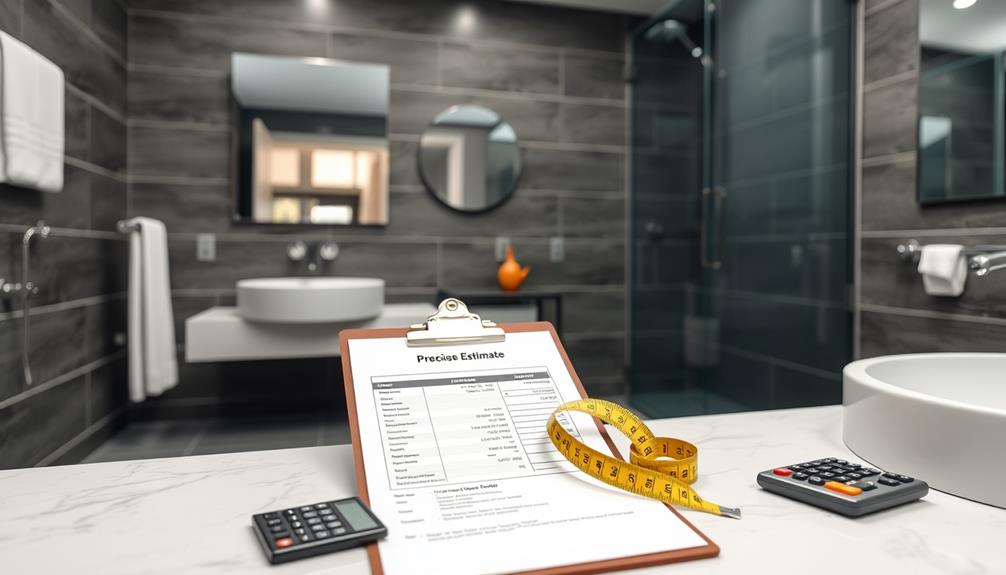
Setting competitive and transparent pricing for your bathroom remodeling services is vital for attracting clients and ensuring profitability. To set pricing effectively, calculate your costs based on materials, labor, and operating expenses, aiming for a gross profit margin of around 15%.
Since the average bathroom remodel costs about $20,000, your pricing should reflect both competitive rates and the quality of service you provide.
Use accurate project estimates by analyzing previous bathroom remodeling jobs and maintaining a database of material and labor costs. This approach enhances your bidding efficiency and helps you provide realistic quotes.
Implementing transparent pricing strategies is important; offer detailed breakdowns for clients to manage expectations and build trust.
Regularly review and adjust your pricing in response to market trends, supply chain changes, and inflation. This not only maintains your profitability but also keeps you attractive to potential clients.
Build a Portfolio of Work
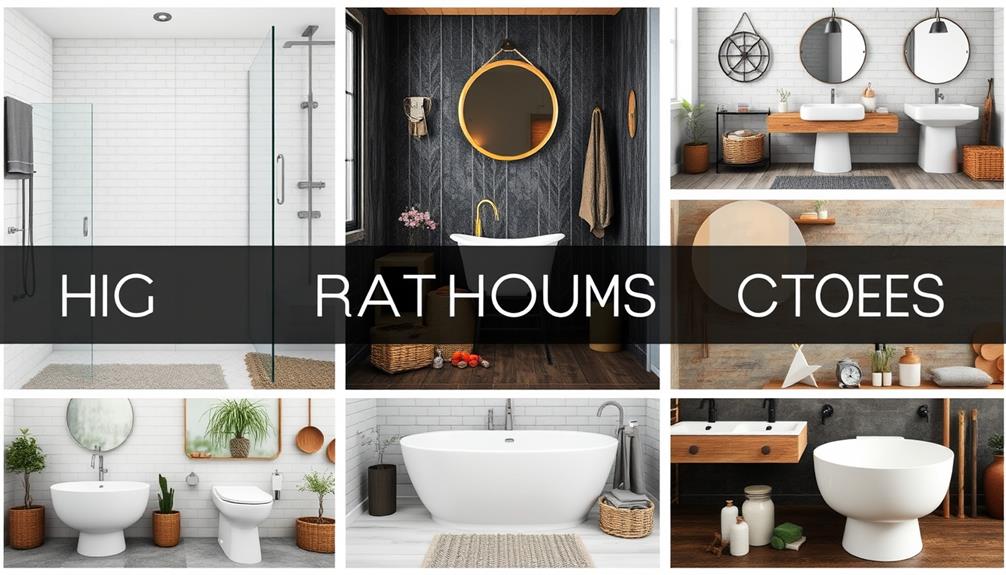
A strong portfolio is essential for showcasing your skills in bathroom remodeling and attracting potential clients. To effectively build a portfolio, consider the following steps:
- Start with Friends and Family: Offer your services for free or at a discounted rate to gather initial project examples. This not only builds your experience but also gives you valuable before-and-after images to highlight your work.
- Document Your Projects: After completing each bathroom remodel, take high-quality photos and write detailed descriptions. Emphasize the materials used, challenges you overcame, and customer satisfaction to create a compelling narrative around each project.
- Create a Professional Website: Make a portfolio website to display your work. Include before-and-after images and client testimonials to build credibility.
Regularly update your site with new projects to reflect your evolving skills and keep potential customers engaged.
Frequently Asked Questions
How Much Profit Should a Contractor Make From a Bathroom Remodel?
You should aim for a net profit margin of about 5% on bathroom remodels. For a $20,000 project, expect to make $3,000 to $4,000, keeping an eye on budgeting and expenses to maximize profitability.
What Comes First in Bathroom Remodeling?
To kick off your bathroom remodeling, assess the existing space first. Identify your functional needs and design preferences, ensuring everything aligns with your vision. This step lays the foundation for a successful remodel process.
What Is the Average ROI on a Bathroom Remodel?
Imagine stepping into a beautifully refreshed bathroom; you'd be pleased to know that a mid-range remodel typically yields a 60-70% ROI. Minor updates can even achieve up to 80%, boosting both appeal and value.
Is Renovation Business Profitable?
Yes, renovation businesses can be quite profitable. With average profit margins of 10% to 20%, you can achieve substantial earnings. Focusing on quality materials and efficient processes enhances customer satisfaction and boosts repeat business, increasing overall profitability.
Conclusion
Starting a bathroom remodeling business is an exciting venture that can lead to great success. By conducting research, developing a solid plan, and securing the right licenses, you’re laying a strong foundation. Building relationships with suppliers, creating a marketing strategy, and showcasing your work will attract clients. Remember, setting competitive prices and providing excellent service will keep them coming back. Embrace the journey, stay passionate, and watch your business thrive in the world of home improvement. To stand out in the competitive market, it’s crucial to stay updated on the latest trends, technologies, and marketing strategies for bathroom remodelers. Utilizing social media, creating an informative website, and networking with real estate agents and interior designers can help expand your reach. Offering promotions, discounts, and referrals can also be effective methods for attracting new clients and growing your business. With dedication and perseverance, your bathroom remodeling business can become a trusted and sought-after name in the industry.
